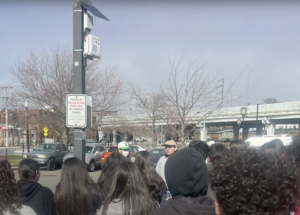Who is a member?
Our members are the local governments of Massachusetts and their elected and appointed leadership.

Chelsea’s All America City application highlighted the city’s air quality monitoring system, consisting of more than eighty sensors that provide real-time data to a community dashboard.
The National Civic League selected Chelsea as one of 10 All-America City Award winners for 2025, recognizing the city’s efforts to improve sustainability, resilience and environmental justice.
A video highlighting Chelsea’s award-winning work focuses on efforts to improve air quality, address extreme heat, and produce clean energy. Community engagement is at the heart of each project, which City Manager Fidel Maltez said is “part of our DNA.”
“These are not the city’s projects; they are our community’s projects,” he said in a recent interview.
The 2025 edition of the NCL’s All-America City awards focused on resident-driven efforts to create a more sustainable future for their communities. Maltez said the award recognizes the value of Chelsea’s work and its potential for emulation around the country.
More than 40 city representatives, including staff, local officials, community leaders and residents, attended the awards ceremony on June 29 in Denver, Colorado.
A compact and densely developed community just north of Boston, Chelsea faces environmental challenges related to its industrial economy, highway traffic, the Tobin Bridge, proximity to Logan Airport, pollution, and excessive heat — hazards that Maltez said are “not something Chelsea is going to take laying down.”
City staff worked with residents as well as staff from Boston University’s School of Public Health and the Boston Society of Landscape Architects to develop a Cool Block project, which led to the planting more than 60 trees in the city’s hottest block, transforming a vacant lot into a public park, and painting the Boys and Girls Club roof white to reflect sunlight and reduce ambient heat.
City residents who had experienced Hurricane Maria in Puerto Rico in 2017 and lived for months without power in the storm’s wake collectively advocated for reliable energy and increased resiliency. In response, the city created a microgrid with solar panels and large-capacity batteries for critical public infrastructure to keep key services running in the event of a climate disaster. Any surplus energy will be sold back to the electrical supplier to reduce residents’ energy costs.
To gather data on the city’s pollution levels, Chelsea partnered with Northeastern University to deploy more than 80 air sensors throughout the city. The sensors provide real-time data and updates for residents to access through an online, multilingual dashboard, and supplies the city with valuable information that can be used in future advocacy.
“At a time when low-income and immigrant communities across the nation are under attack, we stand here proudly to say: Chelsea is strong, Chelsea is united,” Maltez said during his acceptance speech in Denver. “From clean air to cool blocks to energy justice — Chelsea is a testament that when frontline communities lead, bold climate solutions follow. Chelsea is what resilience looks like. Chelsea is what justice sounds like.”
Chelsea also won the All-America City Award in 1998 and 2014.
• Link to the National Civic League’s website for more details about Chelsea’s award-winning programs